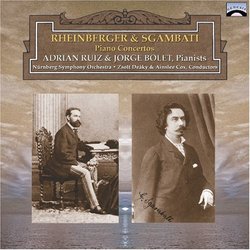TWO PERSUASIVE PRODIGIES
Melvyn M. Sobel | Freeport (Long Island), New York | 09/25/2001
(5 out of 5 stars)
"Though hardly recognized today as more than Romantic era "curiosities," both Giovanni Sgambati (1841-1914) and Joseph Rheinberger (1839-1901) were composers phenomenally gifted from an early age, prolific, accomplished, unique musicians both, and highly regarded in their mutual countries of Italy and Germany, respectively. That musical history should relegate them to mere footnotes seems close to perversity, as the beauty and continuous invention of their piano concertos easily proves.
Sgambati, a most interesting, multi-talented man, whose champions included no less than Liszt and Wagner, and whose undaunted efforts widened dramatically the scope of 19th century Italian music beyond the singe-mindedness of its country's pre-occupation with opera, composed a single piano concerto--- his G Minor (c. 1878)--- amongst a significant output of sundry piano music, chamber and symphonic works, and a Requiem Mass. With a running time of nearly thirty-eight minutes, Sgambati's concerto is a magnum opus whose unity lies in its expert balance of strength and lyricism, gripping bravura and vivid imaginative detail. The imposing first movement Moderato maestoso exemplifies Sgambati's incredible gifts for compositional melodrama: wonderfully infused palpable tension and release, ingenious melodic twists, and completely satisfying moments of sheer beauty, coming frequently, and at exactly the right places. The thrilling initial piano entry is a perfect example: bold, electrifying, gorgeous. It sets us up for a movement of biblical proportions, and certainly motivates pianist Bolet, whose spectacular playing is every bit up to the task--- and then some! From swirling excitement that rivets us to our seats, we enter the heartfelt world of the second movement Romanza, a brief bittersweet dialogue between soloist and orchestra that leads us gently into the rousing brass fanfare of the Allegro animato finale, piano blazing away, orchestra in full pursuit, culminating in an exceptionally exciting mix.
Rheinberger, like his contemporary, composed, as well, a single concerto for piano--- his A-Flat (1876)--- and, like Sgambati, was an impressive talent, a man of great accomplishment, and a musician of innate sensitivity and skill, ardently recognized and admired during his lifetime. The Op. 94 reflects Rheinberger's melodic bent, hinged between states of dreamy melancholy and unbridled bravura, so easily heard in the opening Moderato, a movement of grandeur and grace that is visionary and subtle, simultaneously. The second movement Adagio is utterly beguiling, especially in its attractively naive piano runs and its introspection. The Allegro energico finale is surprisingly anomalous, quirky and ingenious! Although Rheinberger tempts us initially with what seems to be the standard big, bold opening declaration in piano solo, he veers quickly, and dramatically, in favor of a movement that incorporates, essentially, a personal nostalgia at its heart, and a creativity, second to none, that sparks it, most radiantly, forward.
Pianists Bolet and Ruiz are masters of their domains here, their arguments for these concertos powerfully given, both in sentiment and virtuosity. The Nurnberg Orchestra, conducted by maestros Cox and Deaky, lends its full weight and clarity to these grand works, amplifying the all but needless neglect they have endured. Together, pianists, conductors and orchestra exonerate these concertos completely.
No quibbles about the sound, either. Transferred to CD from the original Genesis LPs of 1972, these recordings spring to life unrestrained, vibrant, essential. The piano, particularly, is captured remarkably well. A sensational release in every respect.
[Running time: 69:38]"


 Track Listings (6) - Disc #1
Track Listings (6) - Disc #1